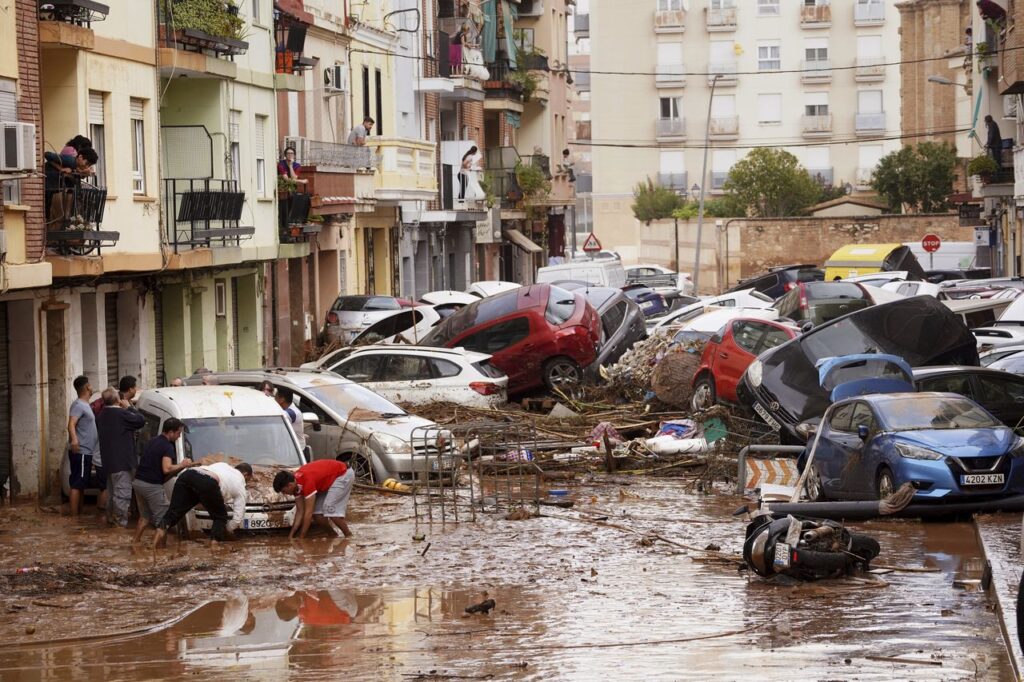Valencia Floods: The cost of climate change denialism

Image credits: Alberto Saiz/AP
Climate change denialism kills… and governments still aren’t listening. The end of October held Spain’s deadliest flash flood, killing hundreds of people particularly within the Valencia region. Scientists have attributed these ‘Monster’ floods once again to man-made climate change.
Man-made climate change is increasingly talked about with its damaging effects becoming inevitable. While this extreme weather remains unchanged, so does the nation’s preparation for it. Climate change denialism is a stance taken too often by those in power resulting in a lack of funding and focus on defending against this. The recent floods in Valencia are a prime example of the effects it has on the everyday citizen.
The World Weather Attribution has declared that climate change directly impacted the amount of rain that the clouds carried, pushing it up by 7% for every degree of warming. They have linked this directly to the causes of the Spanish flash floods and their ensuing devastation. This, however, is not a new revelation.
Researchers across the globe have been continuing to expose the life-threatening effects climate change is beginning to create. Their efforts have only increased after the devastating results of storm Helene which tore its way through the U.S only weeks before. We continue to see firsthand the destruction of everyday life as a result of man-made climate change while those in power fail both to aid the climate crisis and prepare the public for what that brings. So, what did the Spanish government do to fail their citizens in the growing climate crisis?
One of the Spanish government’s most crucial errors was the lack of communication with the general public from the very beginning. After over eight hours of continued rainfall, a flood was clearly imminent, however, it was not until houses were knee deep in mud and cars floating down the street that a message alert regarding ‘possible flooding’ was issued. Citizens claimed they were left completely blindsided by the flooding and had no opportunity to prepare or evacuate.
Those affected have been left divided as to where the blame should fall. Was this a lack of preparedness on the government’s behalf or a denial of impending danger? This need for communication was strengthened through the aid, or lack thereof, given post flood. Those in poverty-stricken areas were left without help or any form of alert for days, knowing their loved ones could be lost and buried under the rubble the rain left behind. Both the community and those following along through the media are looking to the authoritie’s lack of focus on aid in the following days that cost valuable lives.
The underfunding and lack of prioritisation of water infrastructure and flood defences increased the loss of life in the event of the floods significantly. Throughout the past 20 years there have been several plans drawn to aid defence against extreme weather. Almost 18 years prior, plans for flood works were prepared to be installed at the Poyo ravine. These exact plans however expired in 2017 as ‘no work had been initiated’. If it had been enacted, the damage caused to the surrounding areas would have been considerably minimised.
Climate change evidently escalated the magnitude of such a disaster, rainfall like this has not been seen since the 1950s. Nevertheless, it appears that the errors of the government who funded poor infrastructure and allowed people to settle in these high-risk areas massively contributed to the traumatic death toll.
The citizens of Spain have come together in protest against the failure of the government, claiming the blood to be on their hands. The authorities accept their role in the flash flooding and discussions are in place on how to handle future events such as these, countries like Germany are also taking note from the failures of Spain. The country aims to make improvements for the future but the climate change denialism which grasps countries across the world was undoubtedly an overarching contributor to the 2024 Valencian floods.
Words by Lucy Bysouth





